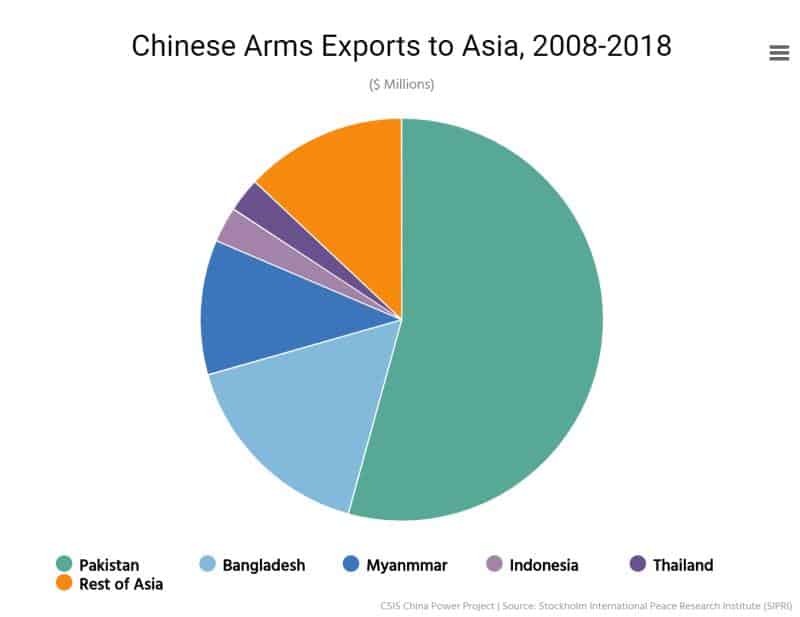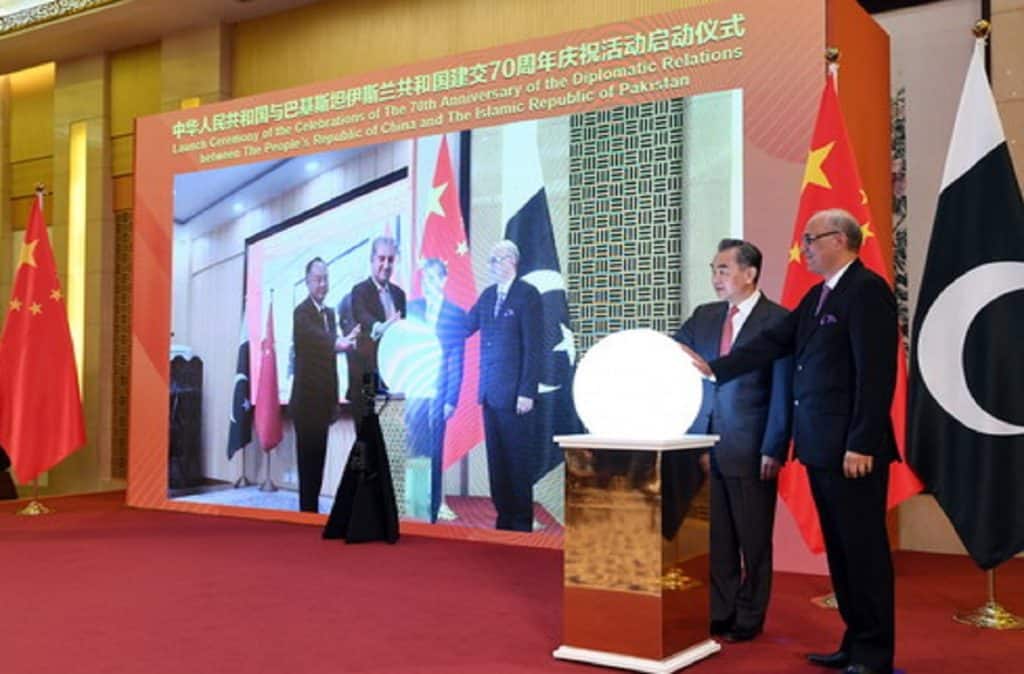“Pakistan was one of the first countries to recognize New China. Ever since our diplomatic relations began in 1951, we have enjoyed mutual understanding, respect, trust and support and our friendship and cooperation have flourished. We are truly good neighbours, close friends, trusted partners and dear brothers.” (President Hu Jintao, Islamabad, 24 November 2006)
China, Pakistan is known as “a sincere and reliable Friend”. ( (President XI Jinping)
By Rana Danish Nisar
In March 2021, the Islamic Republic of Pakistan and the People’s Republic of China “Iron Brothers” kicked off the 70th anniversary of their diplomatic ties. Both countries began their celebrations with a virtual ceremony in Islamabad and Beijing respectively and plan to celebrate it until date of May 21, 2021.

Since the ancient time, Pakistan and China have had historical, geographical and ancient juxtapositions, along with deep ties. The abbots of ancient China, as well as the penitents, ie “Faxian and Xuznanag”, went to the illustrious “Buddhist” academies of Pakistan with the aim of learning the customs, norms, values and the teachings of “Buddhism”. In contemporary historical environment, the month of May of the year 1951 was a central and significant moment in the modern history of Pakistan and also of China, when both countries inaugurated their bilateral diplomatic relations and sowed the seeds of profound bilateral political and economic relations. and economic.
Over the past seventy or seventy years, bilateral relations have now been tagged with “Friendship for All Seasons”, “Brothers of Iron”, “Friendship in the Shade of the Sun” and “Strategic Partners”. Furthermore, the friendship between Pakistan and China has also been marked with the friendship “higher than the Himalayas” and “deeper than the oceans”. Moving on, the first ever interaction between the two nations’ premieres took place on the eve of the “Bandung Conference” in the year 1955, when the Prime Minister of Pakistan M. Ali Bogra and the Chinese Primer Zhou Enlai met. Subsequently, the Pakistani Prime Minister H. S. Shuharwardi goes to China and the reciprocal visit is entrusted to Zhou Enlai.
The first agreement which is commonly known as the “border agreement” was signed between two countries in the year 1963 which resulted in deeper trust, love and care between two countries. Immediately after this agreement, Pakistan’s first national flag carrier named “PIA (Pakistan International Airlines)” began its flight to the People’s Republic of China in 1964. The final agreement was signed by foreign ministers Chen Yi for the Chinese side and Zulfikar Ali Bhutto for the Pakistani side. The deal was moderately profitable for Pakistan, but of great political significance, as it reduced the potential for conflict between China and Pakistan. The then Pakistani foreign minister, Zulfikar Ali Bhutto, played a decisive role in bringing Pakistan and China closer and in overturning their relationship which would later become a “maxim” in international relations. Speaking to the National Assembly in 1962, he said:
“I should like to make it clear beyond all doubt that we have friendly relations with the People’s Republic of China and that nothing will be permitted in any way to endanger those relations. Our relations with China are an independent factor in our foreign policy and not contingent on any other. In the best interests of Pakistan, we shall maintain the spirit of goodwill, friendship and cordiality with the great People’s Republic of China. I declare that our friendship with China is not tainted by any form of bargain or barter. It is steadfast amity between two neighbouring Asian States.”
In the preliminary years of the decade of the 1970s, Pakistan played its pivotal role in the year 1971 to shift relations between China and the United States from strangeness to rapprochement. Due to the complex climate of the “Cold War” and super complex geopolitical settings, Pakistan strongly supported the People’s Republic of China at the United Nations in the year 1971. Reciprocally, along with Chinese support for Pakistan in times of need and during the period of military stalemate between India and Pakistan in the years 1965 and 1971, China also condemned Indian nuclear “(ab) normality” in 1974, when India secured its seat in the elite “Nuclear Club”, creating an endemic “nuclear race” in South Asia and becoming a source of destabilization in the region. Since then, both China-Pakistan countries have moved side by side, supporting each other. Pakistan always stands up and gives favors and supports the “one China policy” and supports China on the issue of “Xinjiang, Hong Kong, South China Sea, Taiwan and Tibet”. Reciprocally, China supports Pakistan on the issue of “IIOJ & K (illegally occupied Indian Jammu and Kashmir)”. Also, China always shows its support for Pakistan at the regional and international forum, for example UN, UNSC, SCO etc.
On the Kargil crisis, however, China has maintained absolute neutrality by emphasizing a bilateral resolution of the issue through dialogue. Shortly after the Kargil incident in late 2001, Indo-Pakistani tensions escalated again, bringing the two nuclear rivals to the brink of war. On this occasion, China urged both Pakistan and India to resolve their dispute by peaceful means. Beijing has adopted multi-channel diplomacy to defuse tension and stressed the need for the international community to adopt a more balanced and impartial approach to the problem. Pak-China Joint Statement, issued in Islamabad on December 19, 2010 on the conclusion of Premier Wen Jiabao’s historic visit to Pakistan, highlighted the following points:
– It is important to deepen the China-Pakistan all-weather strategic partnership;
– China-Pakistan relations have gone beyond bilateral dimensions and acquired broader regional and international ramifications;
– Friendship and cooperation between Pakistan and China serve the fundamental interests of the two countries, and contribute to peace, stability and development in the region and beyond;
– The two sides will enhance their strategic coordination, advance pragmatic cooperation and work together to meet the challenges in pursuit of common development.
– Later, the 2005 Pakistan-China Treaty for Friendship and Cooperation and Good Neighbourly Relations also proved to be a key instrument as it enables both countries to strengthen their strategic, economic and cultural relations.
Moreover he said that;
“China and Pakistan are all-weather strategic partners and good brothers sharing weal and woe. The two countries have weathered through the difficult and glorious history side by side. Let us strengthen our confidence, stand together through thick and thin, and jointly create a bright future for China-Pakistan relations.”
In the context of economic and trade, Pakistan highly supports Chinese orientated BRI (Belt & Road Initiative) project which has aim to economic integration and win-win comprehensive global growth. Under the kind umbrella of BRI, the Pakistan’s based flagship Chinese Project named “CPEC (China-Pakistan Economic Corridor) with the worth of 64 billion US$ is announced in 2014 which is highly prestigious demonstration joint venture of two countries and accelerate the economic in-depth amalgamation and regional juxtaposition. Under the kind shadow of CPEC, Pakistan’s infrastructure, industry, economic zones, energy sector, agriculture and social as well as economic domains will be flourished. Pakistan security advisor Sartaj Aziz said that about the CPEC,
“The CPEC is the flagship project for the Chinese President’s vision of the „One Belt, One Road‟ and that Pakistan-China cooperation on the CPEC would enhance connectivity and contribute to prosperity and development in the entire region.”
Moreover, Sartaj Aziz said that CPEC offer win-win situation for China and Pakistan. He said;
“He underlined that during the 65 years since establishment of relations between the two countries, their relationship has come far too long and the strength of it was most visible through China-Pakistan Economic Corridor – a flagship initiative for economic prosperity and industrial development in the region. He said that CPEC was poised to benefit the people of not just the two countries but also the entire region by creating new jobs and opening new vistas for economic cooperation. Many participants believed that the dream for a better tomorrow and common destiny could be achieved through shared vision of regional connectivity and integration.”
Former Pakistan’s President P. Musharraf once said that;
“We particularly look forward to materializing cooperation with China in the energy sector where establishment of oil refineries, oil storage facilities and gas pipelines stand out. He continued, When the Karakoram Highway was built, the world called it the eighth wonder, and we can create the ninth and tenth wonders by establishing energy pipelines and railway linkages between the two fast growing economies.”
Additionally. China fortifies Pakistan’s defense and security and embolden Pakistan’s position in the Southern Asia and beyond.

Despite U.S strategic convergence and growing support to India’s role at the regional and global level, China remains calm and self-confident. China-Pakistan relations are based on mutual interests and they seem destined to grow. Pakistan should, however, remain sensitive to the complexities that surround this relationship. Face to the evolving India-USA strategic partnership, since-2004, and the sharing of American modern sophisticated weapons to India and U.S. high support of India at global forum i.e. UNSC, NSG etc., China exceedingly supports her “Iron-brother” Pakistan. Most recently, China awarded “Type-054 frigates” to Pakistan and also supported the development of combat tanks i.e. “Al-Khalid” and “JF-Thunder” fighter jets.
Crawling towards more trustworthy relations, almost 28,000 Pakistani students are studying in China at different levels including MBBS, Engineering, Undergraduate’s, and Masters and Doctorate students. In the hazardous times of “COVID-19” pandemic the availability of “Masks” and “Vaccines” for Pakistan nation was the first priority of China, meanwhile Pakistan was stood along with China, rejecting all the allegations from the West. China supported Pakistan and donated 200,000 ordinary face masks, 2,000 N-95 face masks, five ventilators, 2,000 testing kits and 2,000 medical protective clothes mainly used by doctors and paramedics to fight with the virus and supported Pakistani students.
In summary, China-Pakistan relations can be considered symbol of peace, harmony, synchronization of win-win benefits and stability of the region. So I can conclude by confirming Pakistan’s commitment to building a closer China-Pakistan community, intended to further strengthen of the deep ties, for a bright common future.
Rana Danish Nisar The author is a PhD (International Relations) Student at the School of Politics and International Studies (SPIS). He holds Mphil in (International Relations), Masters in (Pakistan Studies), and Masters in (International Relations) degrees. He won acceptance Harvard Project for Asian and International Relations HPAIR (USA), 2017. His research interests are broadly in South Asian Affairs, South Asia Geo-Politics, India-Pakistan Relations, South Asian Nuclear Politics, US and South Asia, Indian Ocean, Security studies, South Asian developments studies.
(The views expressed in this article belong only to the author and do not necessarily reflect the editorial policy or views of World Geostrategic Insights).







